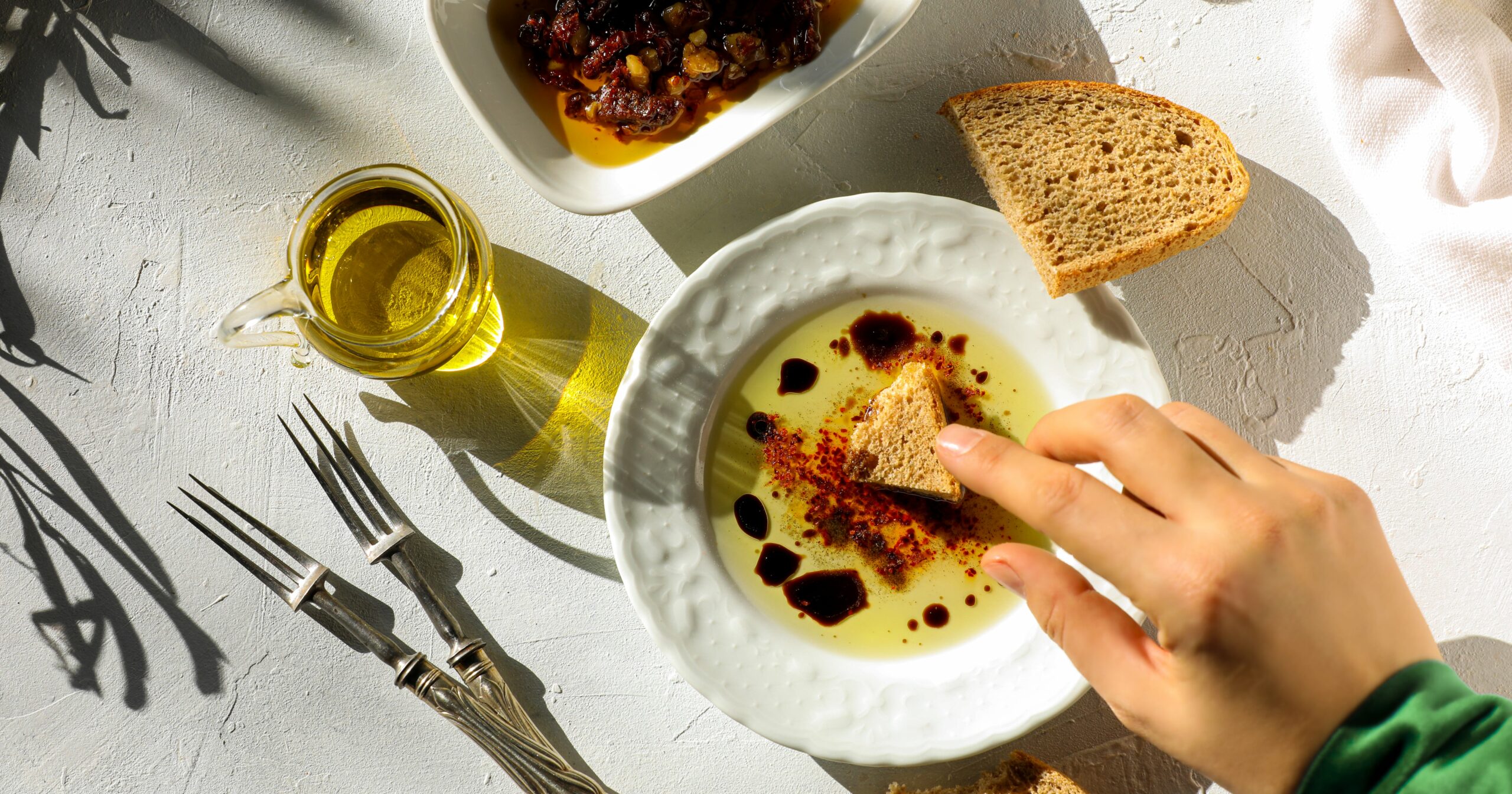Not to be dramatic, but olive oil elevates any meal. Whether it’s drizzled atop cottage cheese toast, whipped into hummus, or used as a dip for fresh bread, olive oil, quite honestly, never misses. But as my trusted bottle stares back at me, I can’t help but wonder, is olive oil actually good for you?
Olive oil is a liquid fat extracted from olives, says Avery Zenker, RD. “It’s produced by harvesting ripe olives, and crushing them into a paste, before the paste is mechanically pressed or centrifuged to extract the oil,” she explains. “High-quality olive oil, like extra virgin olive oil (EVOO), is made without heat or chemical solvents, preserving its natural nutrients and flavor.”
Renowned for its smooth, rich taste, olive oil is a staple in many recipes, but it’s also a cornerstone of the Mediterranean diet, which has been linked to longer life expectancy and lower rates of heart disease, says Morgan Walker, RD.
But that’s just the beginning of olive oil’s hype. Here, registered dietitians provide the inside scoop on EVOO.
Experts Featured in This Article:
Avery Zenker, RD, is a registered dietitian at Everflex Fitness.
Morgan Walker, RD, is a registered dietitian at Lebanon Valley College.
Health Benefits of Olive Oil
- Boosts heart health: “Olive oil is associated with a decreased risk of cardiovascular disease because it’s rich in monounsaturated fats, particularly oleic acid, which can improve lipid profiles by reducing LDL (bad) cholesterol while maintaining or even increasing HDL (good) cholesterol,” Zenker says.
- Promotes cognitive functioning: “The antioxidants in olive oil, including vitamin E and polyphenols (a group of immune-supporting compounds that help fight off infection and disease), may protect against oxidative stress, which contributes to neurodegenerative diseases like Alzheimer’s,” Zenker says. (FYI: oxidative stress is a bodily condition that happens when your antioxidant levels are low and can cause cell damage.) Some research even associates olive oil consumption with better memory and a decreased risk of dementia.
- Regulates blood sugar: Evidence suggests that olive oil may enhance insulin sensitivity, which helps regulate blood sugar and lower the risk of type 2 diabetes, Walker says. “Note that these benefits are often obtained when olive oil is substituted for other types of highly refined oils and high saturated fat sources, like butter and coconut oil,” she explains. Certain compounds in olive oil can also slow carbohydrate digestion, leading to gradual glucose absorption and a more stable glycemic response (food’s effect on blood sugar levels after eating), Zenker adds.
- Reduces blood pressure: Regular consumption of olive oil has been linked to lower blood pressure, which is essential for cardiovascular health and reducing the risk of stroke, Walker says.
- Fights inflammation: EVOO contains polyphenols, such as oleocanthal, which has powerful anti-inflammatory properties, Zenker says. “While inflammation is a necessary process for the body’s resilience, chronic inflammation can negatively affect every system of the body, leading to conditions like arthritis, heart disease, and diabetes.”
- Supports gut health: “Olive oil acts as a prebiotic by supporting healthy gut microbes and decreasing harmful ones,” Zenker explains. Research also suggests that olive oil is associated with improved intestinal barrier function, which protects the body from harmful substances while allowing nutrients and fluid to pass through efficiently.
As for what type of olive oil is best, Walker says EVOO is top-of-the-line. “EVOO is the highest-quality olive oil since it’s extracted through cold pressing without the use of heat or chemicals. This process preserves its natural antioxidants, polyphenols, and healthy monounsaturated fats, which are responsible for many of its health benefits,” she explains. “EVOO also contains more beneficial compounds compared to refined olive oils, such as light olive oil, which undergo additional processing that can strip away nutrients.”
That said, this doesn’t necessarily mean that other types of olive oils are unhealthy, Walker says. “EVOO just stands out as the best choice regarding maximizing health benefits.”
Potential Downsides of Olive Oil
Olive oil is generally well-tolerated in moderation (as with most things in life, moderation is key). However, people prone to acid reflux or those with gallbladder or pancreatitis issues should avoid high quantities of olive oil since high-fat foods, olive oil included, can exacerbate symptoms and cause complications, Zenker says. Olive oil also lubricates the bowels, so too much of a concentrated amount can lead to gastrointestinal distress such as diarrhea, nausea, or indigestion.
“Consuming olive oil as the predominant or only fat source in your diet could cause you to miss out on benefits of other fat sources,” Zenker says. “Foods like avocados, nuts, and seeds are also healthy unsaturated fat sources and bring additional nutrients like fiber, protein, vitamins, minerals, and antioxidants. A variety of nutritious foods is recommended.” Olive oil also doesn’t offer any fiber, protein, or carbs, so there’s not much of a satiety factor on its own, so it’s best to incorporate it into balanced meals, Zenker adds.
Finally, a word on “fat” since society loves to villainize and misconstrue the different types: “Healthy fats, like those found in olive oil, avocados, fatty fish, and nuts, are rich in monounsaturated fats and polyunsaturated fats, which are essential for overall health, because they support cell function, hormone regulation, and brain health,” Walker says. “In contrast, trans fats, which are found in processed foods, and excessive saturated fats, present in fatty cuts of meat, butter, coconut, and full-fat dairy, can contribute to cardiovascular diseases when consumed in excess, but the key when it comes to types of fat is moderation.”
Olive Oil Nutrition Facts
Olive oil is a solid source of vitamin E and polyphenols, which act as powerful antioxidants, and it’s also low in saturated fat and free of trans fat, cholesterol, sugar, and sodium, Zenker says.
Here’s a snapshot of the nutrition facts for one tablespoon of extra virgin olive oil, per Zenker:
- Calories: 120
- Fat: 14 g (1-2 g saturated, 10-11 g monounsaturated, and 1-2 g polyunsaturated)
- Carbohydrates: 0 g
- Protein: 0 g
- Fiber: 0 g
So, Is Olive Oil Good For You?
Bust out a loaf of bread and get to dipping: “Olive oil, especially EVOO, is incredibly beneficial when used in moderation as part of a balanced diet because its heart-healthy fats and antioxidant properties support overall wellness. It’s a kitchen staple for healthy, flavorful, and versatile home cooking,” Walker says. “Whether drizzled over salads, used for roasting vegetables, or incorporated into homemade dressing, olive oil is a delicious way to elevate your cooking while supporting overall wellness.”
Andi Breitowich is a Chicago-based freelance writer and graduate from Emory University and Northwestern University’s Medill School of Journalism. Her work has appeared in PS, Women’s Health, Cosmopolitan, and elsewhere.




